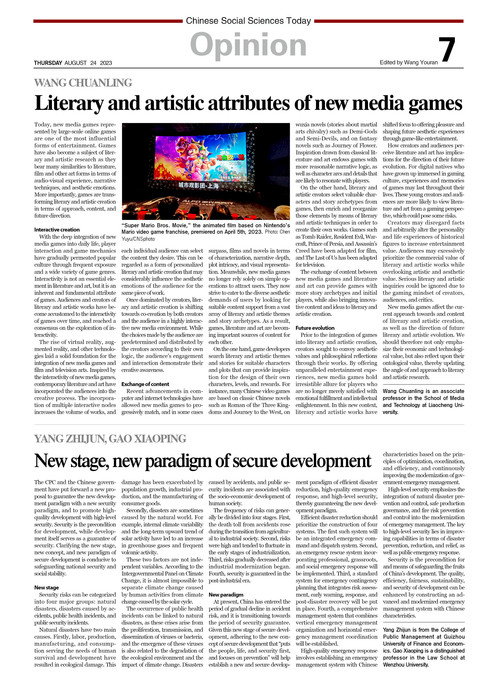New stage, new paradigm of secure development
2023-08-24 14:28:20
The CPC and the Chinese government have put forward a new proposal to guarantee the new development paradigm with a new security paradigm, and to promote high-quality development with high-level security. Security is the precondition for development, while development itself serves as a guarantee of security. Clarifying the new stage, new concept, and new paradigm of secure development is conducive to safeguarding national security and social stability.
New stage
Security risks can be categorized into four major groups: natural disasters, disasters caused by accidents, public health incidents, and public security incidents.
Natural disasters have two main causes. Firstly, labor, production, manufacturing, and consumption serving the needs of human survival and development have resulted in ecological damage. This damage has been exacerbated by population growth, industrial production, and the manufacturing of consumer goods.
Secondly, disasters are sometimes caused by the natural world. For example, internal climate variability and the long-term upward trend of solar activity have led to an increase in greenhouse gases and frequent volcanic activity.
These two factors are not independent variables. According to the Intergovernmental Panel on Climate Change, it is almost impossible to separate climate change caused by human activities from climate change caused by the solar cycle.
The occurrence of public health incidents can be linked to natural disasters, as these crises arise from the proliferation, transmission, and dissemination of viruses or bacteria, and the emergence of these viruses is also related to the degradation of the ecological environment and the impact of climate change. Disasters caused by accidents, and public security incidents are associated with the socio-economic development of human society.
The frequency of risks can generally be divided into four stages. First, the death toll from accidents rose during the transition from agricultural to industrial society. Second, risks were high and tended to fluctuate in the early stages of industrialization. Third, risks gradually decreased after industrial modernization began. Fourth, security is guaranteed in the post-industrial era.
New paradigm
At present, China has entered the period of gradual decline in accident risk, and it is transitioning towards the period of security guarantee. Given this new stage of secure development, adhering to the new concept of secure development that “puts the people, life, and security first, and focuses on prevention” will help establish a new and secure development paradigm of efficient disaster reduction, high-quality emergency response, and high-level security, thereby guaranteeing the new development paradigm.
Efficient disaster reduction should prioritize the construction of four systems. The first such system will be an integrated emergency command and dispatch system. Second, an emergency rescue system incorporating professional, grassroots, and social emergency response will be implemented. Third, a standard system for emergency contingency planning that integrates risk assessment, early warning, response, and post-disaster recovery will be put in place. Fourth, a comprehensive management system that combines vertical emergency management organization and horizontal emergency management coordination will be established.
High-quality emergency response involves establishing an emergency management system with Chinese characteristics based on the principles of optimization, coordination, and efficiency, and continuously improving the modernization of government emergency management.
High-level security emphasizes the integration of natural disaster prevention and control, safe production governance, and fire risk prevention and control into the modernization of emergency management. The key to high-level security lies in improving capabilities in terms of disaster prevention, reduction, and relief, as well as public emergency response.
Security is the precondition for and means of safeguarding the fruits of China’s development. The quality, efficiency, fairness, sustainability, and security of development can be enhanced by constructing an advanced and modernized emergency management system with Chinese characteristics.
Yang Zhijun is from the College of Public Management at Guizhou University of Finance and Economics. Gao Xiaoping is a distinguished professor in the Law School at Wenzhou University.


